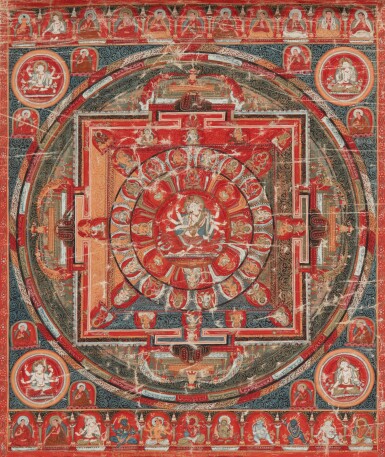Indian, Himalayan & Southeast Asian Works of Art
Indian, Himalayan & Southeast Asian Works of Art

Property of a New England Collection
A Bhagavani Sitatapatra Mandala, Tibet, Sakya Order, Ngor monastery, 16th Century, before 1535
拍卖已结束
September 20, 05:33 PM GMT
估价
120,000 - 180,000 USD
拍品信息
描述
Property of a New England Collection
A Bhagavani Sitatapatra Mandala
Tibet, Sakya Order, Ngor monastery, 16th Century, before 1535
20 by 17 in. (50.8 by 43.2 cm)
The white eight-armed goddess with three faces, white, blue and red, holding a parasol (chattra) in her principal right hand and a victory banner (dhvaja) in the left, a wheel (dharmachakra), elephant goad (ankusa) and bow (chapa) in her outstretched right hands, and a diamond sceptre (vajra), noose (pasha) and arrow (sara) in the left, seated at the centre of the mandala palace in regal posture (rajalilasana), with an entourage of twenty deities within the concentric inner circles and four in the corners without, Hindu deities seated on assorted mounts (vahana) along the inner walls together with the four keepers of the palace gates, all encircled by multi-coloured lotus petal and flame borders, with manifestations of Sitatapatra flanked by Sakya lamas at the outer quadrants, the upper register with Buddha, Sitatapatra or Tara, and a lineage of Sakya hierarchs, the lower register with teachers, protectors and associated deities, with a Tibetan inscription on the red border beneath, scrolling floral motif in margins to the left and right, and the painting framed in blue cloth fishtail mounts weighted by a red painted wooden roller.
Himalayan Art Resources item no. 13764.
According to the inscription beneath the lower register, the mandala was dedicated to the revered teacher Konchog Pelwar (1445-1514) by Lhachog Sengge (1468-1535), the ninth abbot of Ngor monastery. Compare a Ngor monastery Chakrasamvara mandala in the Rubin Museum of Art, also commissioned by Lhachog Sengge and dedicated to Konchog Pelwar, with similar scrollwork background, floral margins, upper and lower registers with pillars issuing from kalasha vases supporting festooned white stupas, see Jeff Watt, https://www.himalayanart.org/items/65020.
Ngorchen Kunga Sangpo (1382-1456) founded Ngor monastery in 1429 and commissioned thangkas including sets of mandalas and portraits of the Sakya Lamdre lineage holders to be painted by itinerant Newar artists, setting the precedent for a Ngor painting style in the Nepalese manner seen in this Sitatapatra mandala, see David Jackson, A History of Tibetan Painting, Wien, 1996, pp. 77-82. Compare design and detail on the mid fifteenth century mandalas painted by Newar artists for Kunga Sangpo in Steven M. Kossak and Jane Casey Singer, Sacred Visions: Early Paintings from Central Tibet, New York, 1998, pp. 165-71, cat. nos. 47a, b, c.
